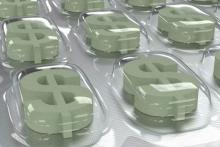User login
Questions linger as to whether federal health care payment policies will encourage – or stifle – the entry of more biosimilars into the marketplace.
Getting the biosimilar approval process right “doesn’t matter unless we get the charging/reimbursement process right,” Rep. Joe Barton (R-Tex.), chairmen emeritus of the House Energy and Commerce Committee, said Feb. 4 during a Health Subcommittee hearing. Without a workable reimbursement process “there’s no incentive to create the drug in the first place. Nobody’s going to do it.”
At issue is how the Centers for Medicare & Medicaid Services plans to pay for biosimilars. The 2016 Medicare Physician Fee Schedule establishes that biosimilars would receive the same reimbursement code as their biologic innovator product and be paid at a weighted average of the average sales price of all biosimilars in that code, plus 6% of the innovator product.
Rep. Frank Pallone (D-N.J.), ranking member of the subcommittee, expressed concern over the policy. “I worry that this inappropriately treats biosimilars like generic drugs and will disincentivize manufacturers from entering the biosimilars marketplace. ... Biosimilars are not generics. Each is its own unique product and biosimilars go through a much more stringent approval process.”
Sean Cavanaugh, deputy administrator and director of the CMS, testified that in terms of market forces, there are enough similarities between generic drugs and biosimilars to maintain that kind of similarity. He added, however, that the CMS is open to changing reimbursement methodology “if we thought that our payment policy was not accomplishing what we expected it to.”
Rep. Brett Guthrie (R-Ky.), vice chairman of the subcommittee, said the reimbursement scheme could lead to “inappropriate switching between biosimilars – switching to a lower cost that is not the same [and] a less vibrant biosimilar market altogether.”
Mr. Cavanaugh noted that the CMS spends more than $1 billion on each of the top six drugs it pays for, all of which are biologics. “I think that alone creates the opportunity for a very vibrant market in biosimilars,” he said.
In addition, he did not see switching as an issue.
“Physicians do not order biologics or other drug products by billing code,” Mr. Cavanaugh said. “Similarly, pharmacists do not derive what switchings they are allowed to do based on billing codes.”
Questions linger as to whether federal health care payment policies will encourage – or stifle – the entry of more biosimilars into the marketplace.
Getting the biosimilar approval process right “doesn’t matter unless we get the charging/reimbursement process right,” Rep. Joe Barton (R-Tex.), chairmen emeritus of the House Energy and Commerce Committee, said Feb. 4 during a Health Subcommittee hearing. Without a workable reimbursement process “there’s no incentive to create the drug in the first place. Nobody’s going to do it.”
At issue is how the Centers for Medicare & Medicaid Services plans to pay for biosimilars. The 2016 Medicare Physician Fee Schedule establishes that biosimilars would receive the same reimbursement code as their biologic innovator product and be paid at a weighted average of the average sales price of all biosimilars in that code, plus 6% of the innovator product.
Rep. Frank Pallone (D-N.J.), ranking member of the subcommittee, expressed concern over the policy. “I worry that this inappropriately treats biosimilars like generic drugs and will disincentivize manufacturers from entering the biosimilars marketplace. ... Biosimilars are not generics. Each is its own unique product and biosimilars go through a much more stringent approval process.”
Sean Cavanaugh, deputy administrator and director of the CMS, testified that in terms of market forces, there are enough similarities between generic drugs and biosimilars to maintain that kind of similarity. He added, however, that the CMS is open to changing reimbursement methodology “if we thought that our payment policy was not accomplishing what we expected it to.”
Rep. Brett Guthrie (R-Ky.), vice chairman of the subcommittee, said the reimbursement scheme could lead to “inappropriate switching between biosimilars – switching to a lower cost that is not the same [and] a less vibrant biosimilar market altogether.”
Mr. Cavanaugh noted that the CMS spends more than $1 billion on each of the top six drugs it pays for, all of which are biologics. “I think that alone creates the opportunity for a very vibrant market in biosimilars,” he said.
In addition, he did not see switching as an issue.
“Physicians do not order biologics or other drug products by billing code,” Mr. Cavanaugh said. “Similarly, pharmacists do not derive what switchings they are allowed to do based on billing codes.”
Questions linger as to whether federal health care payment policies will encourage – or stifle – the entry of more biosimilars into the marketplace.
Getting the biosimilar approval process right “doesn’t matter unless we get the charging/reimbursement process right,” Rep. Joe Barton (R-Tex.), chairmen emeritus of the House Energy and Commerce Committee, said Feb. 4 during a Health Subcommittee hearing. Without a workable reimbursement process “there’s no incentive to create the drug in the first place. Nobody’s going to do it.”
At issue is how the Centers for Medicare & Medicaid Services plans to pay for biosimilars. The 2016 Medicare Physician Fee Schedule establishes that biosimilars would receive the same reimbursement code as their biologic innovator product and be paid at a weighted average of the average sales price of all biosimilars in that code, plus 6% of the innovator product.
Rep. Frank Pallone (D-N.J.), ranking member of the subcommittee, expressed concern over the policy. “I worry that this inappropriately treats biosimilars like generic drugs and will disincentivize manufacturers from entering the biosimilars marketplace. ... Biosimilars are not generics. Each is its own unique product and biosimilars go through a much more stringent approval process.”
Sean Cavanaugh, deputy administrator and director of the CMS, testified that in terms of market forces, there are enough similarities between generic drugs and biosimilars to maintain that kind of similarity. He added, however, that the CMS is open to changing reimbursement methodology “if we thought that our payment policy was not accomplishing what we expected it to.”
Rep. Brett Guthrie (R-Ky.), vice chairman of the subcommittee, said the reimbursement scheme could lead to “inappropriate switching between biosimilars – switching to a lower cost that is not the same [and] a less vibrant biosimilar market altogether.”
Mr. Cavanaugh noted that the CMS spends more than $1 billion on each of the top six drugs it pays for, all of which are biologics. “I think that alone creates the opportunity for a very vibrant market in biosimilars,” he said.
In addition, he did not see switching as an issue.
“Physicians do not order biologics or other drug products by billing code,” Mr. Cavanaugh said. “Similarly, pharmacists do not derive what switchings they are allowed to do based on billing codes.”
FROM A HOUSE ENERGY AND COMMERCE HEALTH SUBCOMMITTEE HEARING

